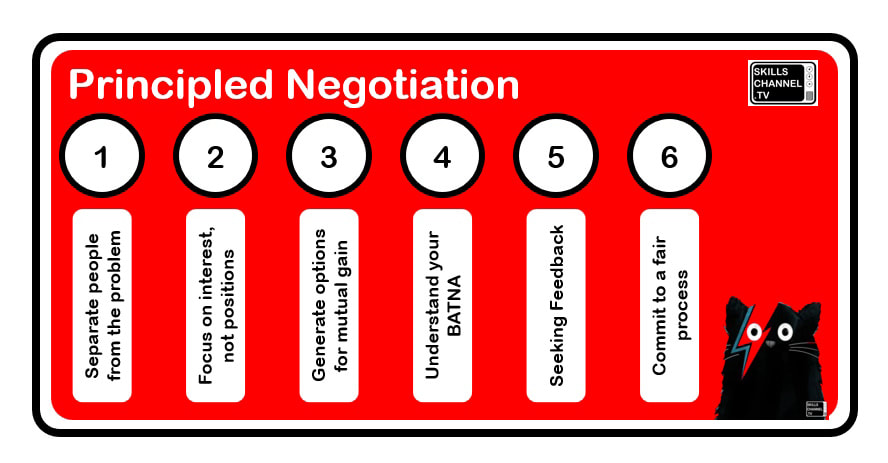|
The Value of Principled Negotiation
Principled negotiation is an approach developed by Fisher and Ury in the 1981 best-selling book Getting to Yes. Principled negotiation is interest-based. The aim of principled negotiation is to maintain a relationship after the negotiation and once agreements have been made. It’s focus is collaboration, not competition and personal gain. Here, creative sector coach Alec McPhedran of Skills Channel TV gives an introduction to principled negotiation Principled negotiation, also known as interest-based negotiation or integrative negotiation, is a collaborative approach to resolving conflicts or reaching agreements. This method was developed by Roger Fisher and William Ury in their book Getting to Yes: Negotiating Agreement Without Giving In, and it's based on the idea that negotiation can be a problem-solving process rather than a win-lose competition. What are the key elements of principled negotiation: Separate People from the Problem: Focus on the issues at hand and avoid personal attacks. Treat the other party with respect and try to understand their perspective. This helps to prevent emotional barriers and maintain a constructive atmosphere for negotiation. Focus on Interests, Not Positions: Instead of sticking to fixed positions, identify and discuss the underlying interests, needs, and concerns of both parties. By understanding what each side truly wants, you can often find creative solutions that satisfy both parties. Generate Options for Mutual Gain: Encourage brainstorming and the development of multiple possible solutions. This allows for a range of choices and helps both parties find mutually beneficial agreements. Insist on Using Objective Criteria: Rather than relying on arbitrary standards or subjective judgments, base the agreement on objective criteria that are fair and widely accepted. This helps ensure that the agreement is seen as equitable by both parties. BATNA (Best Alternative to a Negotiated Agreement): Understanding your BATNA and the other party's BATNA is essential. Your BATNA is your alternative if no agreement is reached, and it serves as a benchmark for assessing the quality of any proposed agreement. A strong BATNA gives you negotiating leverage. Commit to Fair Process: Ensure that the negotiation process is fair, transparent, and inclusive. This helps build trust and increase the likelihood of a successful outcome. Principled negotiation is often contrasted with positional negotiation, in which parties rigidly adhere to specific demands and seek to maximize their own gain without considering the interests of the other party. By focusing on interests and seeking mutual gains, principled negotiation can lead to more sustainable and cooperative agreements, making it a valuable approach for resolving conflicts and reaching deals in various contexts, such as business, diplomacy, and personal relationships. Alec McPhedran Chtd Fellow CIPD, Chtd Mngr CMI, MAC, MCMI is the managing director of Skills Channel TV, a training company for talented creative people. He specialises in one to one coaching, facilitated learning, media training and team development. For further information, contact 0121 366 87 99 or visit www.skillschannel.tv. Copyright © Alec McPhedran 2023
0 Comments
|
AuthorA trainer, coach and facilitator helping people acheive. Archives
November 2023
Categories
All
|

 RSS Feed
RSS Feed
